Analysis of Ethical Concerns in Milgram's Experiment
VerifiedAdded on 2022/08/24
|5
|1216
|41
Report
AI Summary
This report critically examines the ethical implications of Stanley Milgram's obedience experiment. It argues that the experiment fundamentally violated the Tri-Council Policy Statement (TCPS) and the principles of a Research Ethics Board. The analysis focuses on three key ethical principles: respect for persons, concern for welfare, and justice. The report highlights how Milgram's deception of participants, failure to obtain informed consent, and disregard for their well-being, including instances of induced stress and seizures, contravened these principles. Furthermore, it addresses the imbalance of power between the experimenter and participants, questioning the equitable distribution of benefits and burdens. The report references relevant literature to support its claims, concluding that the Milgram experiment was ethically flawed due to its disregard for participant safety, autonomy, and fair treatment.
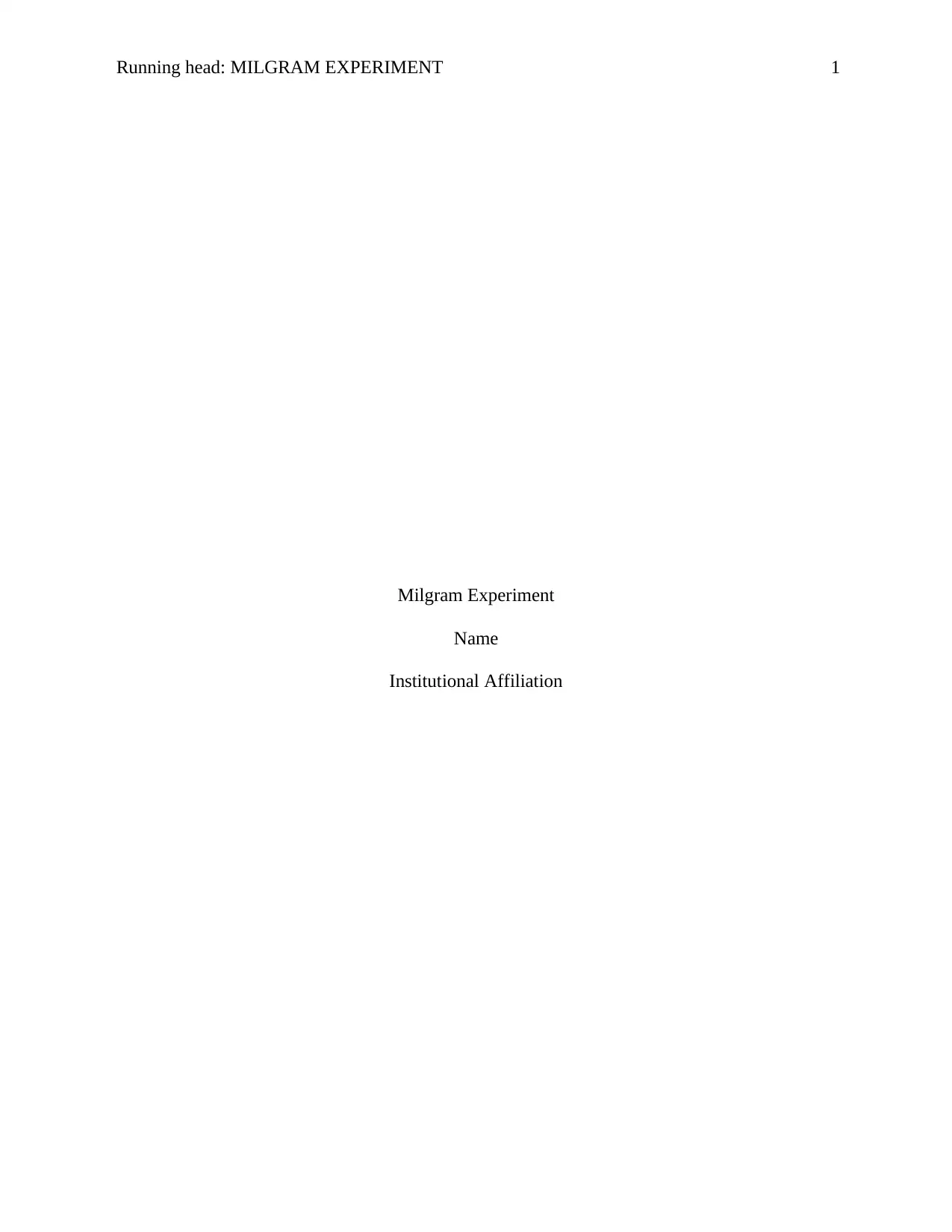
Running head: MILGRAM EXPERIMENT 1
Milgram Experiment
Name
Institutional Affiliation
Milgram Experiment
Name
Institutional Affiliation
Paraphrase This Document
Need a fresh take? Get an instant paraphrase of this document with our AI Paraphraser
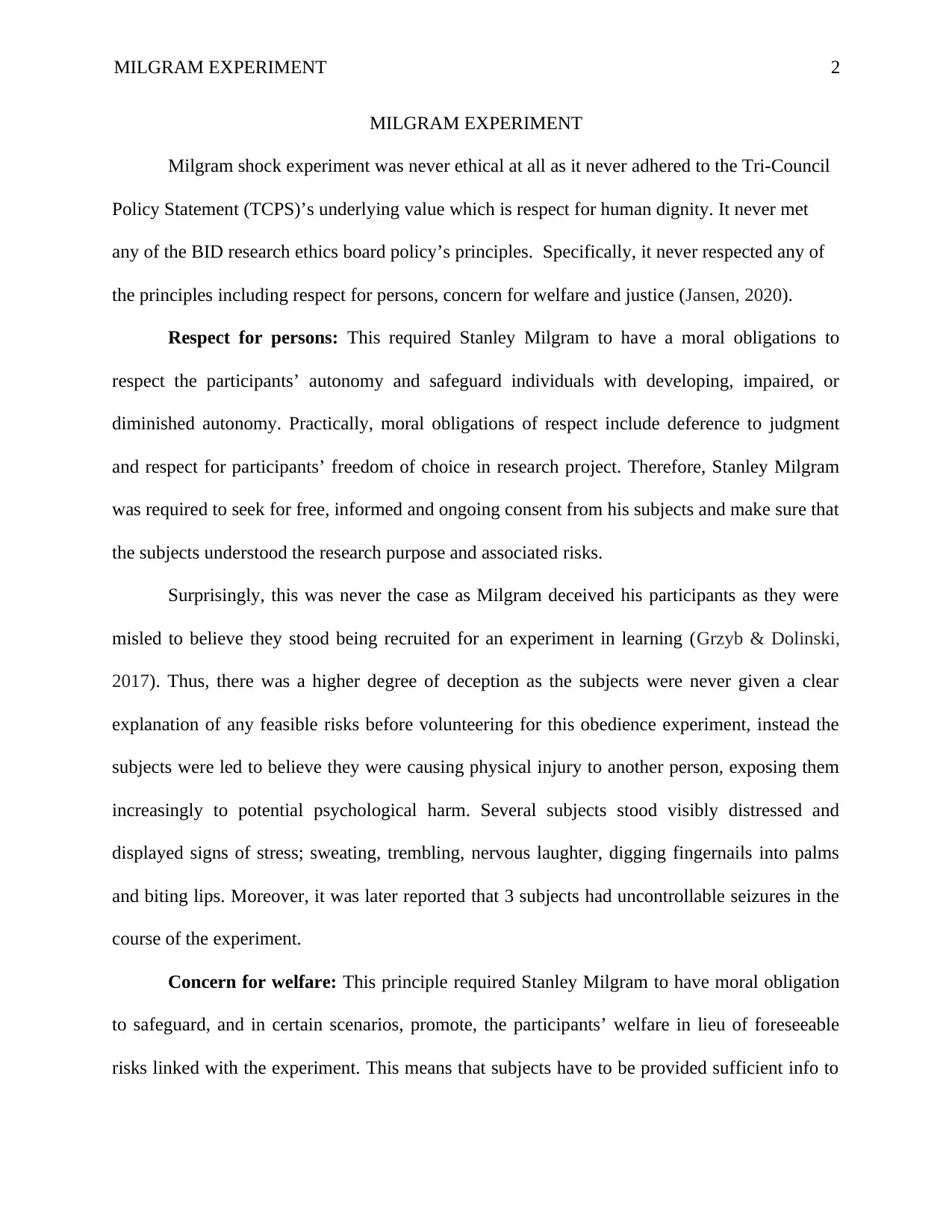
MILGRAM EXPERIMENT 2
MILGRAM EXPERIMENT
Milgram shock experiment was never ethical at all as it never adhered to the Tri-Council
Policy Statement (TCPS)’s underlying value which is respect for human dignity. It never met
any of the BID research ethics board policy’s principles. Specifically, it never respected any of
the principles including respect for persons, concern for welfare and justice (Jansen, 2020).
Respect for persons: This required Stanley Milgram to have a moral obligations to
respect the participants’ autonomy and safeguard individuals with developing, impaired, or
diminished autonomy. Practically, moral obligations of respect include deference to judgment
and respect for participants’ freedom of choice in research project. Therefore, Stanley Milgram
was required to seek for free, informed and ongoing consent from his subjects and make sure that
the subjects understood the research purpose and associated risks.
Surprisingly, this was never the case as Milgram deceived his participants as they were
misled to believe they stood being recruited for an experiment in learning (Grzyb & Dolinski,
2017). Thus, there was a higher degree of deception as the subjects were never given a clear
explanation of any feasible risks before volunteering for this obedience experiment, instead the
subjects were led to believe they were causing physical injury to another person, exposing them
increasingly to potential psychological harm. Several subjects stood visibly distressed and
displayed signs of stress; sweating, trembling, nervous laughter, digging fingernails into palms
and biting lips. Moreover, it was later reported that 3 subjects had uncontrollable seizures in the
course of the experiment.
Concern for welfare: This principle required Stanley Milgram to have moral obligation
to safeguard, and in certain scenarios, promote, the participants’ welfare in lieu of foreseeable
risks linked with the experiment. This means that subjects have to be provided sufficient info to
MILGRAM EXPERIMENT
Milgram shock experiment was never ethical at all as it never adhered to the Tri-Council
Policy Statement (TCPS)’s underlying value which is respect for human dignity. It never met
any of the BID research ethics board policy’s principles. Specifically, it never respected any of
the principles including respect for persons, concern for welfare and justice (Jansen, 2020).
Respect for persons: This required Stanley Milgram to have a moral obligations to
respect the participants’ autonomy and safeguard individuals with developing, impaired, or
diminished autonomy. Practically, moral obligations of respect include deference to judgment
and respect for participants’ freedom of choice in research project. Therefore, Stanley Milgram
was required to seek for free, informed and ongoing consent from his subjects and make sure that
the subjects understood the research purpose and associated risks.
Surprisingly, this was never the case as Milgram deceived his participants as they were
misled to believe they stood being recruited for an experiment in learning (Grzyb & Dolinski,
2017). Thus, there was a higher degree of deception as the subjects were never given a clear
explanation of any feasible risks before volunteering for this obedience experiment, instead the
subjects were led to believe they were causing physical injury to another person, exposing them
increasingly to potential psychological harm. Several subjects stood visibly distressed and
displayed signs of stress; sweating, trembling, nervous laughter, digging fingernails into palms
and biting lips. Moreover, it was later reported that 3 subjects had uncontrollable seizures in the
course of the experiment.
Concern for welfare: This principle required Stanley Milgram to have moral obligation
to safeguard, and in certain scenarios, promote, the participants’ welfare in lieu of foreseeable
risks linked with the experiment. This means that subjects have to be provided sufficient info to
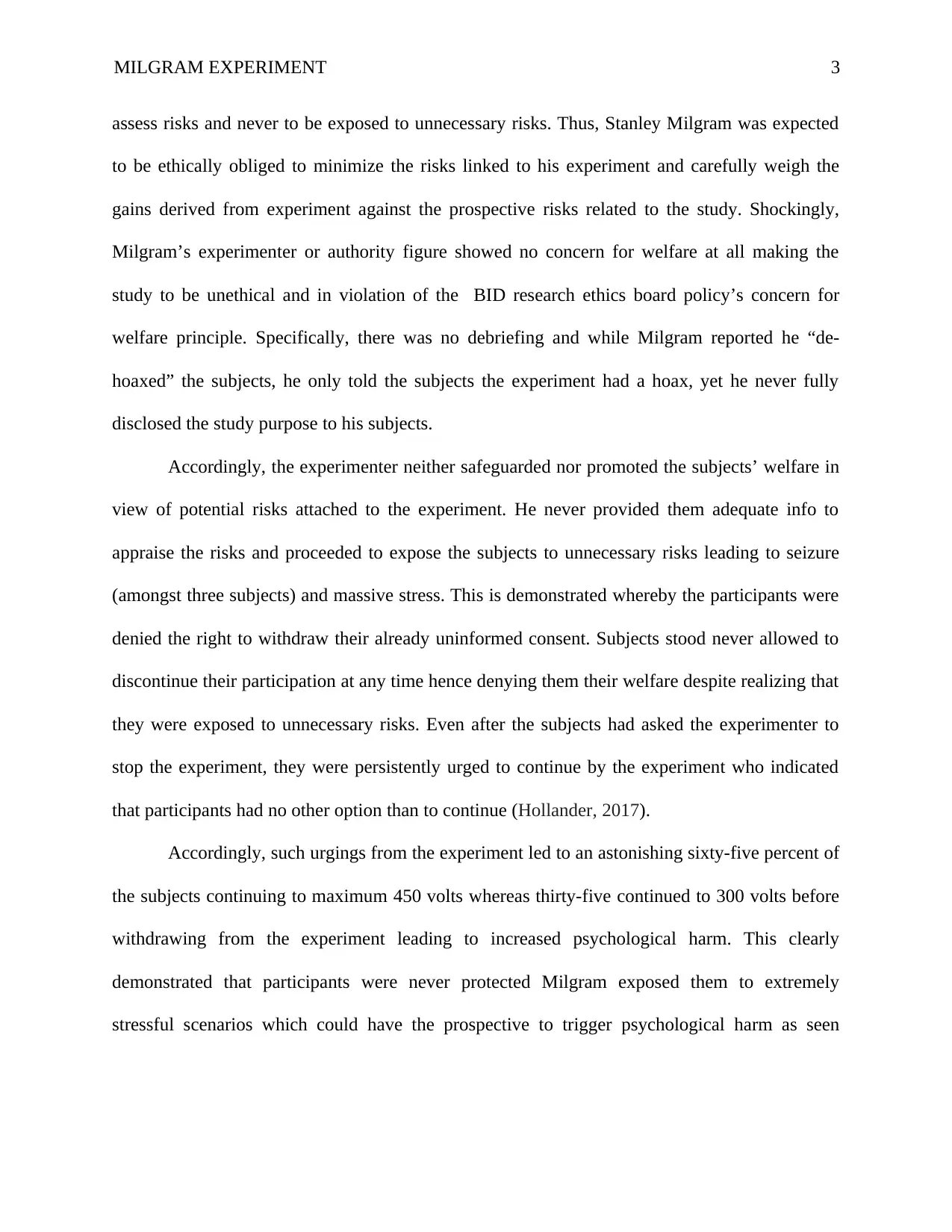
MILGRAM EXPERIMENT 3
assess risks and never to be exposed to unnecessary risks. Thus, Stanley Milgram was expected
to be ethically obliged to minimize the risks linked to his experiment and carefully weigh the
gains derived from experiment against the prospective risks related to the study. Shockingly,
Milgram’s experimenter or authority figure showed no concern for welfare at all making the
study to be unethical and in violation of the BID research ethics board policy’s concern for
welfare principle. Specifically, there was no debriefing and while Milgram reported he “de-
hoaxed” the subjects, he only told the subjects the experiment had a hoax, yet he never fully
disclosed the study purpose to his subjects.
Accordingly, the experimenter neither safeguarded nor promoted the subjects’ welfare in
view of potential risks attached to the experiment. He never provided them adequate info to
appraise the risks and proceeded to expose the subjects to unnecessary risks leading to seizure
(amongst three subjects) and massive stress. This is demonstrated whereby the participants were
denied the right to withdraw their already uninformed consent. Subjects stood never allowed to
discontinue their participation at any time hence denying them their welfare despite realizing that
they were exposed to unnecessary risks. Even after the subjects had asked the experimenter to
stop the experiment, they were persistently urged to continue by the experiment who indicated
that participants had no other option than to continue (Hollander, 2017).
Accordingly, such urgings from the experiment led to an astonishing sixty-five percent of
the subjects continuing to maximum 450 volts whereas thirty-five continued to 300 volts before
withdrawing from the experiment leading to increased psychological harm. This clearly
demonstrated that participants were never protected Milgram exposed them to extremely
stressful scenarios which could have the prospective to trigger psychological harm as seen
assess risks and never to be exposed to unnecessary risks. Thus, Stanley Milgram was expected
to be ethically obliged to minimize the risks linked to his experiment and carefully weigh the
gains derived from experiment against the prospective risks related to the study. Shockingly,
Milgram’s experimenter or authority figure showed no concern for welfare at all making the
study to be unethical and in violation of the BID research ethics board policy’s concern for
welfare principle. Specifically, there was no debriefing and while Milgram reported he “de-
hoaxed” the subjects, he only told the subjects the experiment had a hoax, yet he never fully
disclosed the study purpose to his subjects.
Accordingly, the experimenter neither safeguarded nor promoted the subjects’ welfare in
view of potential risks attached to the experiment. He never provided them adequate info to
appraise the risks and proceeded to expose the subjects to unnecessary risks leading to seizure
(amongst three subjects) and massive stress. This is demonstrated whereby the participants were
denied the right to withdraw their already uninformed consent. Subjects stood never allowed to
discontinue their participation at any time hence denying them their welfare despite realizing that
they were exposed to unnecessary risks. Even after the subjects had asked the experimenter to
stop the experiment, they were persistently urged to continue by the experiment who indicated
that participants had no other option than to continue (Hollander, 2017).
Accordingly, such urgings from the experiment led to an astonishing sixty-five percent of
the subjects continuing to maximum 450 volts whereas thirty-five continued to 300 volts before
withdrawing from the experiment leading to increased psychological harm. This clearly
demonstrated that participants were never protected Milgram exposed them to extremely
stressful scenarios which could have the prospective to trigger psychological harm as seen
⊘ This is a preview!⊘
Do you want full access?
Subscribe today to unlock all pages.

Trusted by 1+ million students worldwide
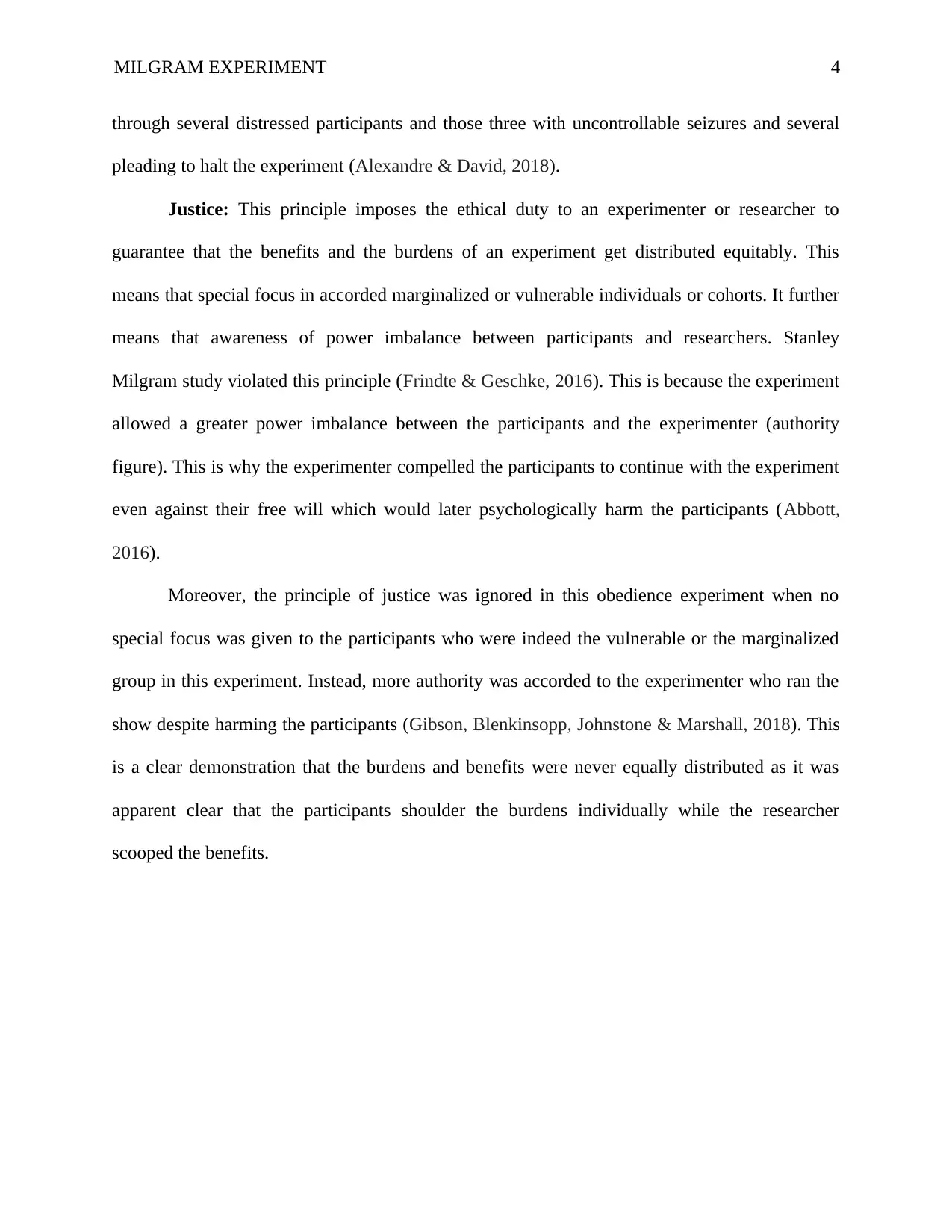
MILGRAM EXPERIMENT 4
through several distressed participants and those three with uncontrollable seizures and several
pleading to halt the experiment (Alexandre & David, 2018).
Justice: This principle imposes the ethical duty to an experimenter or researcher to
guarantee that the benefits and the burdens of an experiment get distributed equitably. This
means that special focus in accorded marginalized or vulnerable individuals or cohorts. It further
means that awareness of power imbalance between participants and researchers. Stanley
Milgram study violated this principle (Frindte & Geschke, 2016). This is because the experiment
allowed a greater power imbalance between the participants and the experimenter (authority
figure). This is why the experimenter compelled the participants to continue with the experiment
even against their free will which would later psychologically harm the participants (Abbott,
2016).
Moreover, the principle of justice was ignored in this obedience experiment when no
special focus was given to the participants who were indeed the vulnerable or the marginalized
group in this experiment. Instead, more authority was accorded to the experimenter who ran the
show despite harming the participants (Gibson, Blenkinsopp, Johnstone & Marshall, 2018). This
is a clear demonstration that the burdens and benefits were never equally distributed as it was
apparent clear that the participants shoulder the burdens individually while the researcher
scooped the benefits.
through several distressed participants and those three with uncontrollable seizures and several
pleading to halt the experiment (Alexandre & David, 2018).
Justice: This principle imposes the ethical duty to an experimenter or researcher to
guarantee that the benefits and the burdens of an experiment get distributed equitably. This
means that special focus in accorded marginalized or vulnerable individuals or cohorts. It further
means that awareness of power imbalance between participants and researchers. Stanley
Milgram study violated this principle (Frindte & Geschke, 2016). This is because the experiment
allowed a greater power imbalance between the participants and the experimenter (authority
figure). This is why the experimenter compelled the participants to continue with the experiment
even against their free will which would later psychologically harm the participants (Abbott,
2016).
Moreover, the principle of justice was ignored in this obedience experiment when no
special focus was given to the participants who were indeed the vulnerable or the marginalized
group in this experiment. Instead, more authority was accorded to the experimenter who ran the
show despite harming the participants (Gibson, Blenkinsopp, Johnstone & Marshall, 2018). This
is a clear demonstration that the burdens and benefits were never equally distributed as it was
apparent clear that the participants shoulder the burdens individually while the researcher
scooped the benefits.
Paraphrase This Document
Need a fresh take? Get an instant paraphrase of this document with our AI Paraphraser
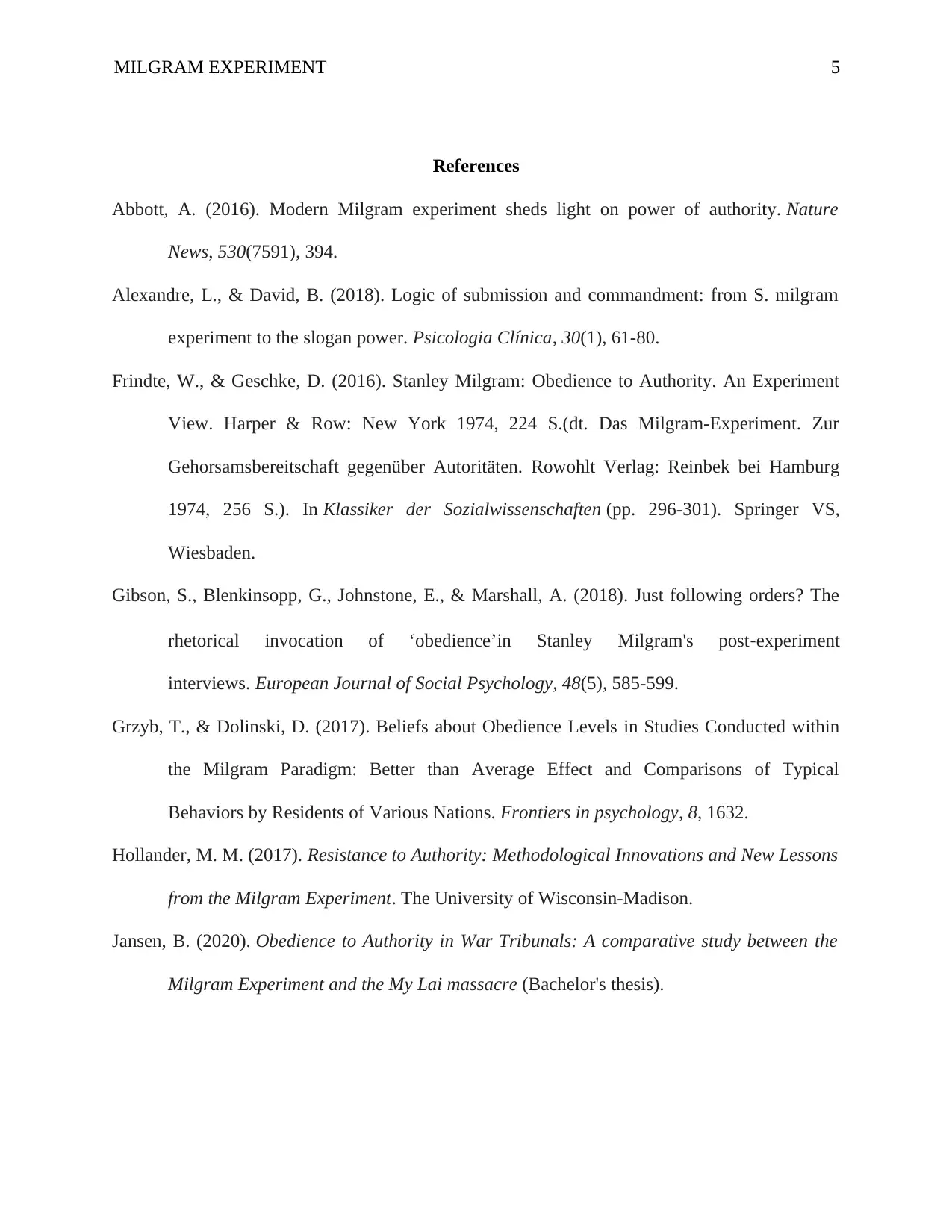
MILGRAM EXPERIMENT 5
References
Abbott, A. (2016). Modern Milgram experiment sheds light on power of authority. Nature
News, 530(7591), 394.
Alexandre, L., & David, B. (2018). Logic of submission and commandment: from S. milgram
experiment to the slogan power. Psicologia Clínica, 30(1), 61-80.
Frindte, W., & Geschke, D. (2016). Stanley Milgram: Obedience to Authority. An Experiment
View. Harper & Row: New York 1974, 224 S.(dt. Das Milgram-Experiment. Zur
Gehorsamsbereitschaft gegenüber Autoritäten. Rowohlt Verlag: Reinbek bei Hamburg
1974, 256 S.). In Klassiker der Sozialwissenschaften (pp. 296-301). Springer VS,
Wiesbaden.
Gibson, S., Blenkinsopp, G., Johnstone, E., & Marshall, A. (2018). Just following orders? The
rhetorical invocation of ‘obedience’in Stanley Milgram's post‐experiment
interviews. European Journal of Social Psychology, 48(5), 585-599.
Grzyb, T., & Dolinski, D. (2017). Beliefs about Obedience Levels in Studies Conducted within
the Milgram Paradigm: Better than Average Effect and Comparisons of Typical
Behaviors by Residents of Various Nations. Frontiers in psychology, 8, 1632.
Hollander, M. M. (2017). Resistance to Authority: Methodological Innovations and New Lessons
from the Milgram Experiment. The University of Wisconsin-Madison.
Jansen, B. (2020). Obedience to Authority in War Tribunals: A comparative study between the
Milgram Experiment and the My Lai massacre (Bachelor's thesis).
References
Abbott, A. (2016). Modern Milgram experiment sheds light on power of authority. Nature
News, 530(7591), 394.
Alexandre, L., & David, B. (2018). Logic of submission and commandment: from S. milgram
experiment to the slogan power. Psicologia Clínica, 30(1), 61-80.
Frindte, W., & Geschke, D. (2016). Stanley Milgram: Obedience to Authority. An Experiment
View. Harper & Row: New York 1974, 224 S.(dt. Das Milgram-Experiment. Zur
Gehorsamsbereitschaft gegenüber Autoritäten. Rowohlt Verlag: Reinbek bei Hamburg
1974, 256 S.). In Klassiker der Sozialwissenschaften (pp. 296-301). Springer VS,
Wiesbaden.
Gibson, S., Blenkinsopp, G., Johnstone, E., & Marshall, A. (2018). Just following orders? The
rhetorical invocation of ‘obedience’in Stanley Milgram's post‐experiment
interviews. European Journal of Social Psychology, 48(5), 585-599.
Grzyb, T., & Dolinski, D. (2017). Beliefs about Obedience Levels in Studies Conducted within
the Milgram Paradigm: Better than Average Effect and Comparisons of Typical
Behaviors by Residents of Various Nations. Frontiers in psychology, 8, 1632.
Hollander, M. M. (2017). Resistance to Authority: Methodological Innovations and New Lessons
from the Milgram Experiment. The University of Wisconsin-Madison.
Jansen, B. (2020). Obedience to Authority in War Tribunals: A comparative study between the
Milgram Experiment and the My Lai massacre (Bachelor's thesis).
1 out of 5
Your All-in-One AI-Powered Toolkit for Academic Success.
+13062052269
info@desklib.com
Available 24*7 on WhatsApp / Email
![[object Object]](/_next/static/media/star-bottom.7253800d.svg)
Unlock your academic potential
Copyright © 2020–2026 A2Z Services. All Rights Reserved. Developed and managed by ZUCOL.
